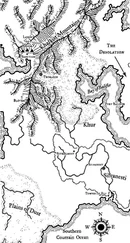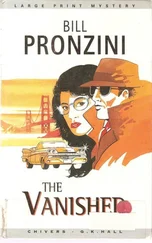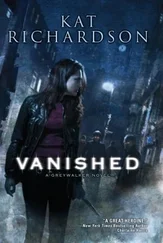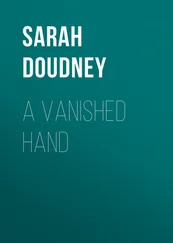‘What about after?’
‘This is the last time you get to see him.’
She leaned in even closer and tabbed the footage on. Doors sliding shut. Train taking off. Disappearing into the tunnel. ‘That’s a bit … creepy , isn’t it?’
‘In what way?’
‘Well, he just disappears.’
‘People disappear all the time.’
‘Yeah, but they don’t just disappear, do they?’ She tabbed the footage back and looked at me. ‘When people disappear, they wander off somewhere, hide, try not to resurface. Or they die: they commit suicide, someone kills them, something. Their body goes somewhere . But you’ve been through the footage and you can’t see the join. You can’t see where he went. To me …’ She faded out. ‘To me that’s a bit creepy.’
I didn’t say anything, but in the silence I realized Liz might be right: there was something disquieting about Sam Wren’s journey that morning, more so now I’d seen the CCTV video. I still knew, in the rational part of me, the part I built cases on, that Sam had to have left the train – but without being able to see him do it, without the physical act of stepping on to the platform, something troubling remained.
‘I’ll see you in bed,’ she said quietly.
I watched her go and then turned back to the footage. There were twelve thousand CCTV cameras in and around the London Underground. The ticket halls. The platforms. The walkways. The trains. Sam couldn’t have avoided them all.
I had to widen the search.
I woke with a start. Outside I could hear people talking, a car idling, and – even more distantly – the sound of a dog barking. Disorientated and half asleep, I sat up in bed, feeling the sheet fall away, a faint breeze reaching across from the window and clawing at my skin. Seconds later, my phone began buzzing.
I grabbed it. ‘David Raker.’
‘David, it’s Spike. You okay?’
‘Yeah. Late night. What time is it?’
‘7.15. Do you want me to call back?’
‘No.’ I got to my feet, grabbed one of Liz’s least feminine dressing gowns and put it on. I made my way through to the living room, set the phone down and switched to speaker. ‘What have you got for me, Spike?’
‘Sorry it’s taken me so long.’
‘Not a problem.’
‘So, you asked for a complete financial picture, as well as his phone records. I’ll send them through as a PDF, so you can grab them on the move.’
‘Great. Anything I need to know?’
‘Nah, it’s all pretty self-explanatory. The financial stuff runs to about twenty-five pages. The phone records I’m doing a bit of work on: for each of the incoming and outgoing numbers I’ll get you a name and address.’
‘Great work – are those coming over today?’
‘Yeah. Not until a bit later on, though. Getting these names and addresses for you will take longer, but it’ll save you a load of time.’
‘You’re the man, Spike.’
I thanked him and killed the call.
Now it was time to brave the Tube at rush hour.
15
Gloucester Road Tube station sits on the corner of Gloucester Road and Courtfield Road. Its two-tone facade – all glazed terracotta tiles and sandy brick – harks back to the grand old days of the Underground; to a time when the Tube wasn’t just a vessel to get people to their destination, but an experience, a day out. In truth, it was hard to imagine those times on the hot, cramped District line, moving through the bowels of the earth where there was no air, and eventually no daylight.
Heading out of the Tube, I walked the half-mile to the Wrens’ street, then did a 180 and retraced the same route, just as Sam would have done the day he went missing. Fifteen minutes later I was at the main entrance, passing through the three thin arches that would lead me back into the earth.
I took the stairs down to the Circle line platform. The crowds had thinned out in the time I’d been outside. The westbound train was already in the station, but I wanted to go eastbound, so I took a seat on one of the grey metal benches and watched the other passengers. People had always fascinated me: what made them different, how they lied and covered up, how they emoted and broke down. I hadn’t missed the crush of the commute in the years since I’d given up journalism, but I missed the opportunity to watch and learn from the crowds. All the books on kinesics, on the language of the body and the psychology of interviews, helped fill in the blanks. But I’d never learned more than on weekday mornings when I’d been surrounded by a sea of commuters.
Once I was on the eastbound train, I got out at every Circle line station, took the escalators or the stairs up to street level and then made my way back down again. At Westminster – the station that would have been the best and most obvious escape route on the day Sam vanished – I spent a couple of minutes moving between the Circle and Jubilee lines. On a regular work day, Sam would have made the switch in order to go east to Canary Wharf.
Then, about two hours in, I started the journey in reverse – and for the first time a part of me wondered what I was hoping to achieve. In any investigation, you had to feel like you were moving forward; every place you went to, every person you spoke to, had to push the case on. Riding the Tube was a way of understanding Sam better, of getting a feel for his routine. His life. But I’d found nothing of him. No trace of him here, and no trace of him on the footage.
I pushed the doubts down and carried on.
At 11.30, I got back to the gateline at Gloucester Road and noticed a couple of Tube employees. One was standing in a booth watching people pass through; the other was talking to a group of Japanese tourists and pointing to a map. The one in the booth looked up as I approached. He was small, wiry, his eyes dark, his face pale. Close in, his skin seemed too thin, as if it were tracing paper that was about to tear.
‘Morning.’
He nodded in reply. Nothing else.
I ignored the lack of response and pressed on, introducing myself and telling him about Sam. When I was done, I got out a photograph and showed it to him. It was a long shot given the number of people who must have passed through the station every day, but it was a question that needed to be asked. Sometimes, even when you built cases on precision and reason, you had to throw a little mud at the wall and see what stuck.
‘Don’t recognize him,’ he said, his eyes straying across the photo and then away again. He shifted back on the stool he was on, and his thin summer jacket opened a little. Underneath I could see a badge pinned to his shirt: DUNCAN PELL. I assumed, given he was at the gateline, that he was a regular customer-service assistant. It was hard to see him as anything more, as a station supervisor or duty station manager.
‘Are you here permanently?’ I asked.
His eyes came back to me. ‘What?’
‘Do you always work out of this station?’
‘Yeah,’ he said, a frown forming across his brow, as if I was suddenly speaking in a language he didn’t understand. All the time his eyes continued darting left and right; to the gateline, then to the entrance, then back again. Basically anywhere but me.
‘My guy used to pass through here every day.’
Pell snorted. ‘So do a lot of people.’
‘You don’t recognize any of the faces that pass through here?’
‘Some.’
‘But not this one?’
I held up the photograph in front of him again. He glanced at it and away, off to where a group of girls in their late teens were entering the station. Then he shrugged. ‘It’s busy,’ was all he offered, still watching the girls rather than me. I nodded, put the picture away, but didn’t move. The momentary pause seemed to make him uncomfortable. His eyes switched to me, away, then back and there was something in them.
Читать дальше












